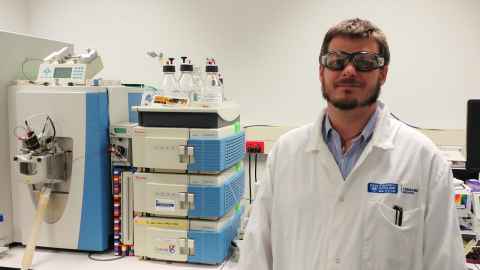Take 10 with... Chris Pook
Dr Chris Pook explains how he analyses plant and animal samples to understand their chemical, physical and biological properties, and the joy of making a new discovery.

1. Describe your research topic to us in 10 words or less.
I study the way that organisms communicate with chemistry.
2. Now describe it in everyday terms!
Almost every interaction between organisms is somehow mediated through physical or chemical means. It’s what we do every day when we cook, smell something, or look with our eyes. The information being carried is typically mediated either through the movement of chemicals from point A to point B or through the properties of chemicals. Colour is a common mediator used by organisms to communicate information about their toxicity or palatability. For example, most of us associate red with danger and have learnt to avoid eating red berries because they may be poisonous. Mimicry is another example where organism don’t have to invest the energy in synthesizing toxic chemicals to deter predators; they can just mimic the characteristics of organisms that already do this.
3. What are some of the day-to-day research activities you carry out?
We take biological samples from organisms (humans or plants), mash them up in the lab and combine them with chemical agents to extract and preserve things of interest. We take the extracts and put them into our analytical equipment to investigate their chemical, physical and biological properties. This helps us understand the purpose, structure and function of those chemicals, as well as how they’re metabolised and transmitted from one organism to another.
4. What do you enjoy most about your research?
The discovery aspect – the opportunity to do something or find out something that nobody else has done before and tell people about it. The moment of discovery is very rewarding, and it’s exciting to get students enthused about the discovery process as well.
5. Tell us something that has surprised or amused you in the course of your research.
During my PhD at Exeter University, one of the professors was studying the origins of sex determination for which she was collecting sperm donations for analysis. I helpfully contributed a vial which I labelled ‘unicorn blood’. A couple of days later I bumped into the PhD student working on the project carrying microscope slides across campus that included my donation!
6. How have you approached any challenges you’ve faced in your research?
Every day is a challenge and you have to embrace problem solving as a way of life. Making assumptions about how easy it is to carry out a piece of work often results in questions from students, technicians or collaborators you’d never even considered because it seemed intuitive to you. You need to have a lot of understanding for humanity and the way that other people work and think, and to support those in your group to get good outcomes. It’s always a team effort and you need to be empathetic to get the best out of people. This approach helps to solve the technical problem in front you, but also helps your collaborator or student come up with new ways of problem solving so they can become more independent.
7. What questions have emerged as a result?
I was trying to solve a problem with an assay [the analysis of a substance in the lab] that wasn’t working properly, despite keeping everything as consistent as possible. Our lab manager asked me what temperature I was carrying out the assay at, and I said ‘bench top temperature’ – as per the paper I was trying to reproduce, but he suggested putting in a heating block just to make sure it was absolutely stable. He was right! Because I’d been using buffers out of the freezer that had been thawed, they were still cold. I’d missed a simple technical solution because I’d been looking at much more complicated problems.
8. What impact is your research having or what impact do you hope it will have?
There are a lot of big ticket health problems out there that science has the ability to deal with and you can see we’re cusp of solving many of the world’s health problems. I’m working on fields as diverse as obesity and metabolic disease, which are huge killers in Aotearoa, and it’s great to be contributing in a small way to that kind of work. We’ve just received funding to investigate the stability of fortified breastmilk that’s used in NICUs and has the potential to help us develop standardised guidelines for the use of fortification to help premature babies grow and reduce their risk of long-term health conditions. One of the things I’m most proud of is the work we’re doing with iwi on the native kawakawa plant. A traditional Maori medicine, we’re analysing its ethnobotany and investigating its pharmacology to explore potential new applications of kawakawa, for example as a new food product.
9. If you collaborate across the University, or outside the University, who do you work with and how does it benefit your research?
I collaborate with researchers at the University’s School of Biological Sciences and at the Human Nutrition Unit, who have the expertise to understand bioenergetics, metabolic efficiency, and thermogenesis (the conversion of energy to heat). We’re also working with Whakatū Iwi in Nelson and our iwi liaison Dr Meika Foster who is an honorary academic at the Liggins Institute. In the past I’ve worked with researchers at the marine mammal unit at Massey University, as well as Dr Sally Gore in Canterbury, who has helped with analytical chemistry work on toxic chemicals in squid species and pilot whales in NZ.
10. What one piece of advice would you give your younger, less experienced research self?
I’ve arrived here via an unconventional route, which I don’t regret, but I think it’s important to keep sight of your ambition and where you want to get to despite what life throws at you.